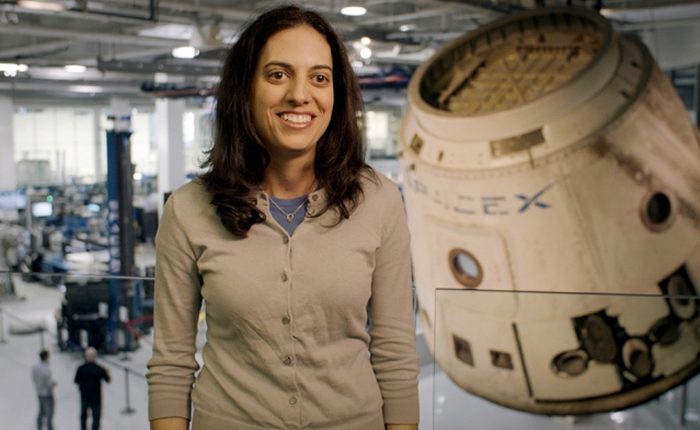MIT graduate joins the space race
Less than 10 years out of MIT, Shana Diez ’02, SM ’03 had helped design and build a commercial spacecraft that could travel into orbit and ferry cargo to and from the International Space Station. Now at SpaceX in Los Angeles, she’s working on a new model that is scheduled to fly with a human crew as early as 2018. She is enthusiastic about plans for human passengers on an orbiting spacecraft, but she’s also thinking beyond it. “I know without question that landing on Mars will happen if we keep working on it,” says Diez, who graduated from MIT with two degrees in aerospace engineering.
“What else do I believe is possible? I don’t put a cap on that anymore,” she says. “Let’s see how far we can take it.”
As the technologies shaping the future of aerospace evolve, Southern California’s rich ecosystem of large and small companies, research and educational partners, military installations, and its culture of risk-taking makes it one of the world’s most competitive regions, according to industry experts.
“LA is the most exciting place in the world for aerospace innovation,” says Diez. A similar sentiment is shared by Jim Cantrell, CEO of Vector Space Systems. “There’s probably more rocket engine and launch vehicle expertise in Southern California than anywhere else in the United States or probably the world,” he says.
As someone who spent most of her senior year in high school building model rockets, Diez is as happy to be in LA as she was to come to MIT. She was offered a spot at a number of top engineering colleges, she says, but chose MIT after visiting campus and witnessing a first-year class “building a flying machine — MIT was the only school where I saw people building anything.”
As a sophomore in 2,000, Diez went on a tour of the space launch facilities at Cape Kennedy in Florida, an Independent Activities Period trip for students in the Department of Aeronautics and Astronautics. “There is nothing more amazing that people do than send people and objects into space, then control their operation and return,” she told MIT News at the time.
After graduation, Diez worked on the Space Shuttle program at NASA in Florida, and then at Jeff Bezos’ Blue Origin, a private company working on spaceflight in Washington. However, she has spent the majority of her career — nearly nine years — at SpaceX.
There, Diez has led reusability efforts for the SpaceX Grasshopper and F9R development vehicle programs. Now, as the company director of building reliability, Diez is known for her wide-ranging technical expertise. She leads a team of engineers, technicians, and inspectors charged with “making the best rockets in the world.”
She credits MIT with inspiring the problem-solving mindset that has set her apart. Academic success, she says, was premised on the ability to approach problems with a kind of fearlessness.
“I tell people the most important thing I learned at MIT was how to independently solve a problem — and not a cookie-cutter problem or problem set,” she says. “No, at MIT it was like: ‘Here is a problem. Nobody knows how to make this work. Nobody knows how to analyze this. Go figure it out.’”
When Diez arrived on the MIT campus, she felt at home. She found herself surrounded by people with similar passions, and engaged in the questioning and conversations that inspire her. This same holds true for the LA region, she says. “This is the best place in the world for people like me,” she says. “There is nowhere better.”
On February 7th, the MIT Campaign for a Better World will be celebrating the breadth of innovation and creativity in the Los Angeles region, which is known to attract dreamers and doers with its no-limits attitude. Long associated with celebrity culture, LA is also home to a different breed of star chasers: a new generation of entrepreneurial private space companies such as SpaceX in Hawthorne and Virgin Galactic in Long Beach.
More information: Massachusetts Institute of Technology (MIT)


